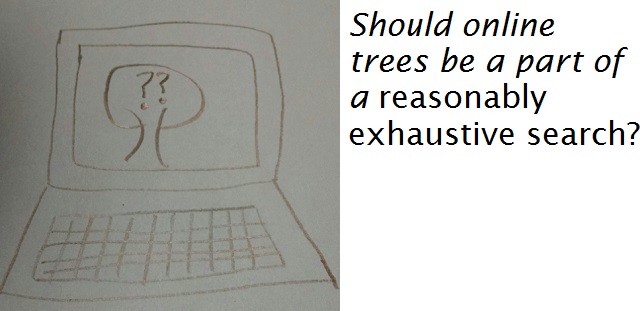In a recent private discussion on Facebook, the topic of whether or not “online trees” should be a part of a “reasonably exhaustive search” was discussed.
I’m not certain.
I’m interested in thoughts.
Categories:
Tags:
This site uses Akismet to reduce spam. Learn how your comment data is processed.

8 Responses
Yes, but one should consider them as derivative sources and subject to error, which means that one must follow up by seeking confirmation from original sources. One might also disprove the claim on the online ne tree, and that is also worth noting and documenting.
The “McLain” article in Appendix B of Tom Jones’s book Mastering Genealogical Proof is a good example of properly using online trees as part of a “reasonably exhaustive” research effort.
Yes, but they should be viewed only as clues to be researched. I have found collateral “lost” relatives on others’ trees that way. I also view sourced trees the same way I view unsourced ones because I have found many with “sources” cited as other online trees, a gedcom that can’t be opened or have terrific sources cited, but they are for a different person with the same name who shouldn’t be in that tree.
As it has been said, “Leave no stone unturned,” so, yes, by all means check the online trees for possible clues. If you do find a clue, or seemingly new information, treat it as you would any other new information and seek to verify it to be sure it “fits.” That being said, once you find a clue, leave other aspects of the tree alone (especially it’s accuracy), lest you drive yourself nuts. This has been stated as a lesson learned from past experience.
I think iti determined b what the the Tree was for,
Was it to have a tree on the wall, you like to fill in spaces, you like to research, you really want to have something to be proud of, do you just want the data of b.m.d.res.occupation, do you ant to know the history of the times and place where the ancestors lived, do you want everything done for you?
You are free to do have a tree, it is your way of thinking. Just be careful how you describe yourself.
I would consider using an on-line tree if it exhibited legitimate sources rather than another tree which used another tree and so forth. I can’t give you a percentage of how many on-line trees I trust, but the number is very low.
Yes definitely, consulting online trees is part of a reasonably exhaustive search. However, if you find trees that might match the information you are looking for you should have a checklist of characteristics. Including compatibility with known information about the family, the number of reliable sources provided in the tree for the individual, their immediate family, and succeeding generation. There may be some more things to add to the checklist based on each individual case. If the tree does well on your checklist, a reasonably thorough search would include trying to recreate its research and either verify or disprove its claims.
One of the problems with Ancestry’s hints is that many of the hints may be your own information. Every time I add something, it becomes at least one new hint, more if others have used my data. I have spoken to them about how I’m getting more own information coming back at me and they claim the system is working just the way it is supposed to.
Jane, you are so right. Emails relating what I had posted long ago are sometimes cause for a nice chuckle.